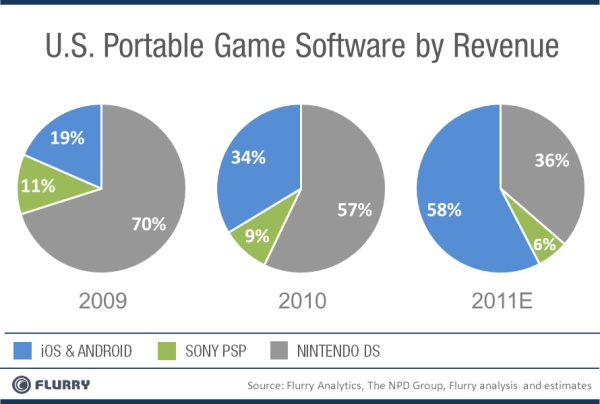Digital content distribution has changed the face of music, altered the way news is consumed and had a notable effect on other industries like magazines, books, television, music, film and more. However, nothing has perhaps been more altered than portable games.

“The most striking trend is that iOS and Android games have tripled their market share from roughly 20 percent in 2009 to nearly 60 percent in just two years,” notes Peter Farago of Flurry. “Simultaneously, Nintendo, the once dominant player, has been crushed down to owning about one-third of market in 2011, from having controlled more than two-thirds in 2009. Combined, iOS and Android game revenue delivered $500 million, $800 million and $1.9 billion over 2009, 2010 and 2011, respectively.”
What is disrupting mobile games is the freemium game model, $0.99 games and the critical mass of smartphones on the market. Nintendo and Sony’s portable game revenue has dropped precipitously, posting a combined $2.2 billion for 2009, $1.6 billion for 2010 and $1.4 billion in 2011.
“Due in part to its demise in the portable game category, Nintendo is facing its first fiscal year loss since the company began reporting profits in 1981,” noted Farago. “Combined with slumping Wii sales, Nintendo is indeed struggling, even with its powerful stable of original IP led by Mario Brothers, and despite the fact that the exchange rate between the Japanese Yen and U.S. dollar is currently in its favor.”
“Equally concerning for Nintendo is that the battle for video game dominance is entering the living room, with entries by both Apple and Google into the TV category,” he added. “Ostensibly, this new class of hardware will create a new platform upon which the digital distribution model of apps will be overlaid. Now, in addition to tablet form-factor competition, the console game industry, which currently pits Microsoft, Sony and Nintendo against each other, will additionally face competition from Apple and Google TV initiatives. Beyond 2011, if Nintendo continues to face financial hardship, it may be forced to consider difficult choices such as divesting its hardware business and distributing its content, for the first time, across non-proprietary platforms.
“In our last review of the portable game category, comparing 2009 to 2010 revenue, we believed Mario was already ‘standing on a burning platform.’ With 2011 numbers now added to the story, it appears that the inferno has intensified, and that Nintendo may truly face a Nokia-like decision to jump or perish in the flames of its own burning platform,” Farago concluded.
Source: blog.flurry.com

